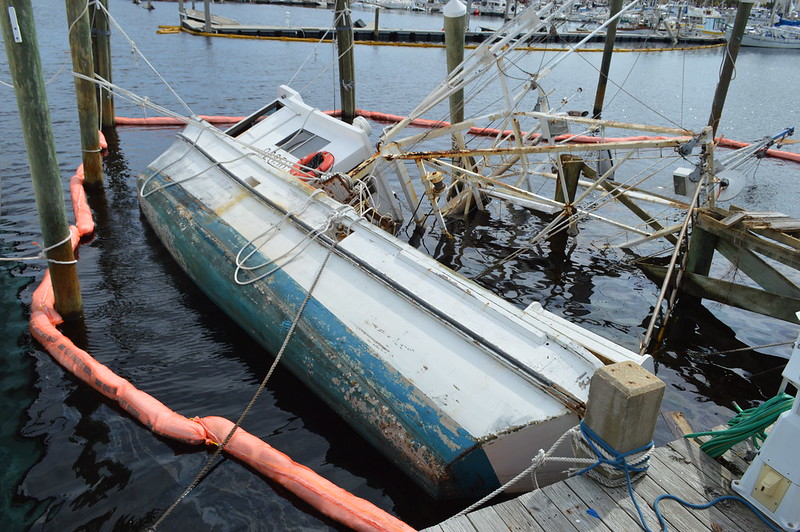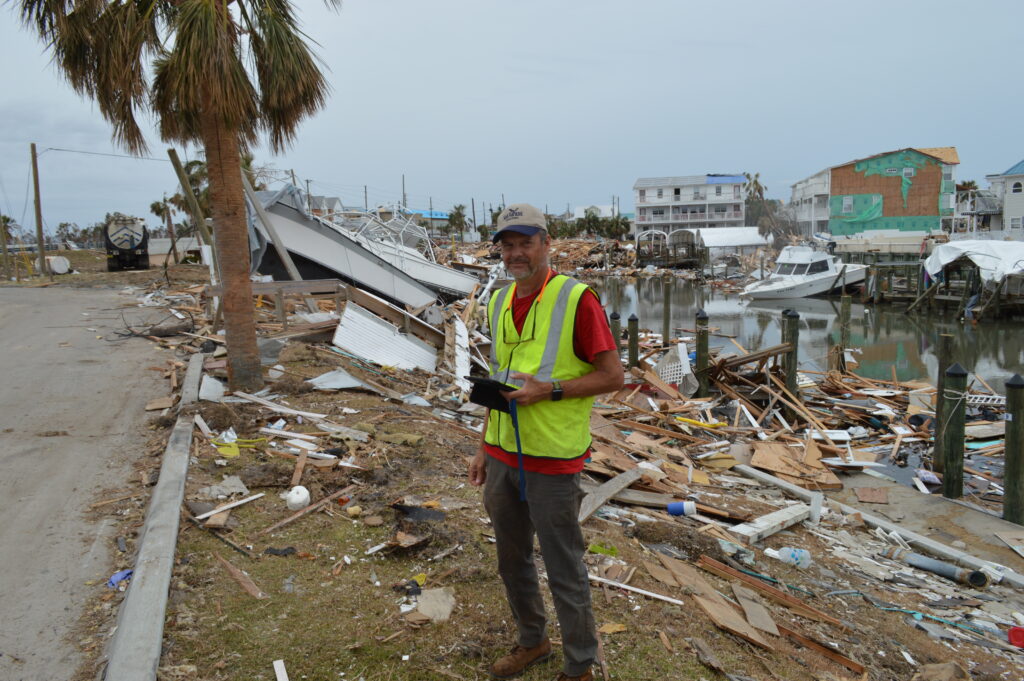
A derelict vessel capsized near a pier in Panama City—image courtesy of Allen Golden.
Deemed “the boating capital of the world”, Florida’s warm weather and scenic waters welcome seafarers year-round; within the past year, the state surpassed 1 million registered recreational vessels!
As the number of vessels in our waters increases, hurricanes and storm surges are becoming more frequent and intense throughout the state.
Hurricane Michael swept through the Panhandle in 2018 generating catastrophic damages. Residents witnessed piles of wreckage along shorelines, docks, and waterfront property – 1370 vessels assessed after the Hurricane in 2019 were derelict.
“Derelict” refers to vessels left in a wrecked, junked, or substantially dismantled condition and cannot recover from current impairment without substantial help, recovery, and repair – this can lead to criminal charges against the registered owner or responsible party.
At-risk vessels are vessels determined to be at risk of becoming derelict with conditions listed in Florida Statutes 327.4107.
“Many people purchase vessels with the intent of fixing them. However, life happens, and people are unable or unwilling to prevent derelict conditions,” says Phil Horning, FWC Division of Law Enforcement Boating and Waterways Section.
Derelict vessels are prone to storm impacts and cost more to retrieve if aground. Additionally, severe weather can magnify the number of derelict vessels if owners do not properly prepare before the storm.
Removing the vessels helped restore property values and provide recreation, solace, and connections to the natural world prized by visitors and those that live here.
Scott Jackson
Removal Efforts
Derelict vessels may prevent navigational access, create hazards to other boaters, impact recreational fishing, and degrade the quality of coastal natural resources by entangling and trapping wildlife.
“Vessels aground can damage important seagrass and oyster reef habitat. Petroleum products can cause pollution issues, along with human waste from onboard toilets,” says Scott Jackson, Florida Sea Grant’s Bay County Extension Agent.

Florida Sea Grant Agent, Scott Jackson, assessing the damages from Hurricane Michael in Panama City – image courtesy of Allen Golden.
They can also end up on private property, creating a legal nightmare for landowners and vessel owners.
In 2020, Florida Sea Grant received a $3 million grant from National Oceanic and Atmospheric Administration (NOAA) and the National Fish and Wildlife Foundation (NFWF) to help restore marine ecosystems and communities by removing marine debris caused by Hurricane Michael. About 500 owners in St. Andrew, St. Joseph, and Apalachicola Bay communities faced debris removal costs. Florida Sea Grant worked with partners at the University of Florida, FWC, and local coastal counties to guide waterfront restoration in residential and state lands.
The team carefully removed vessels to prevent damage to environmental areas. Boards were laid to protect vegetation when sliding the vessel back into deeper water and specialized saws were used instead of cutting torches.
The team removed 2.53 million pounds of debris, including 61 vessels. As a result, 33 acres were enhanced, including critical sea turtles and nesting shorebird habitats on Dog Island.
“The removal relieved psychological reminders of the storm. Removing the vessels helped restore property values and provide recreation, solace, and connections to the natural world prized by visitors and those that live here,” says Jackson.
Prevention
Dynamic climate and storm patterns warrant proper vessel maintenance, regular inspections, and prompt repairs. Owners should always prepare for severe storm events. During approaching storms, vessels should be taken into a safe harbor or removed from the water entirely.
“Vessels stored on land are less subject to storm surge damage than those stored upon the water, “ says Horning.
If a vessel is at-risk and the vessel owner can not bring the vessel into compliance, owners are recommended to apply for the Vessel Turn-In Program; this allows vessel owners to voluntarily surrender their unwanted vessel to the FWC. Surrendered vessels will be removed from Florida waters and destroyed at no cost to the vessel owner.
“By embracing a mindset that prioritizes vigilance and meticulous maintenance, boat owners can protect their investment and contribute to the overall health and safety of Florida’s waterways,” says Jackson.
For more information on derelict vessels and removal programs, contact Scott Jackson at [email protected].